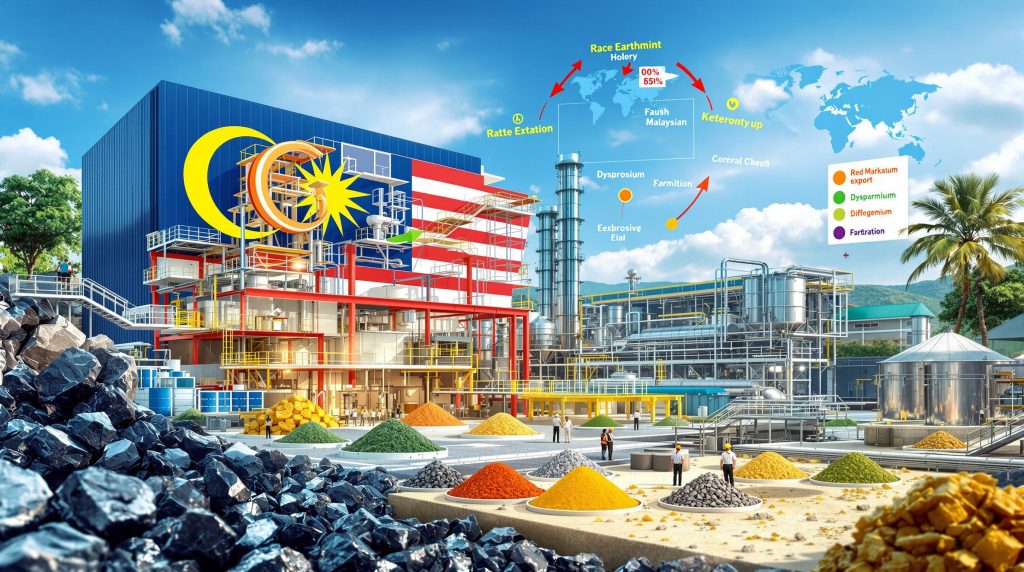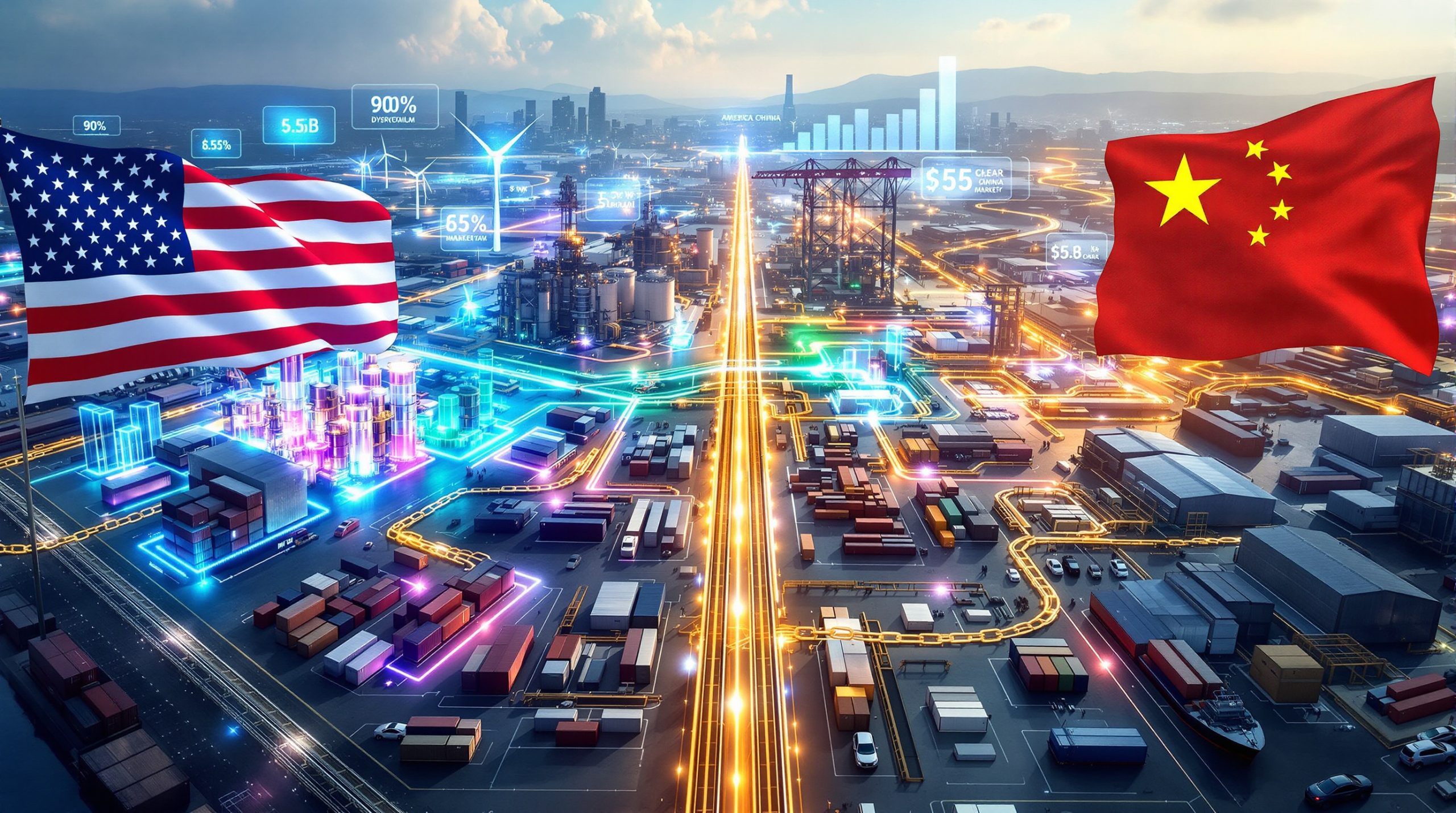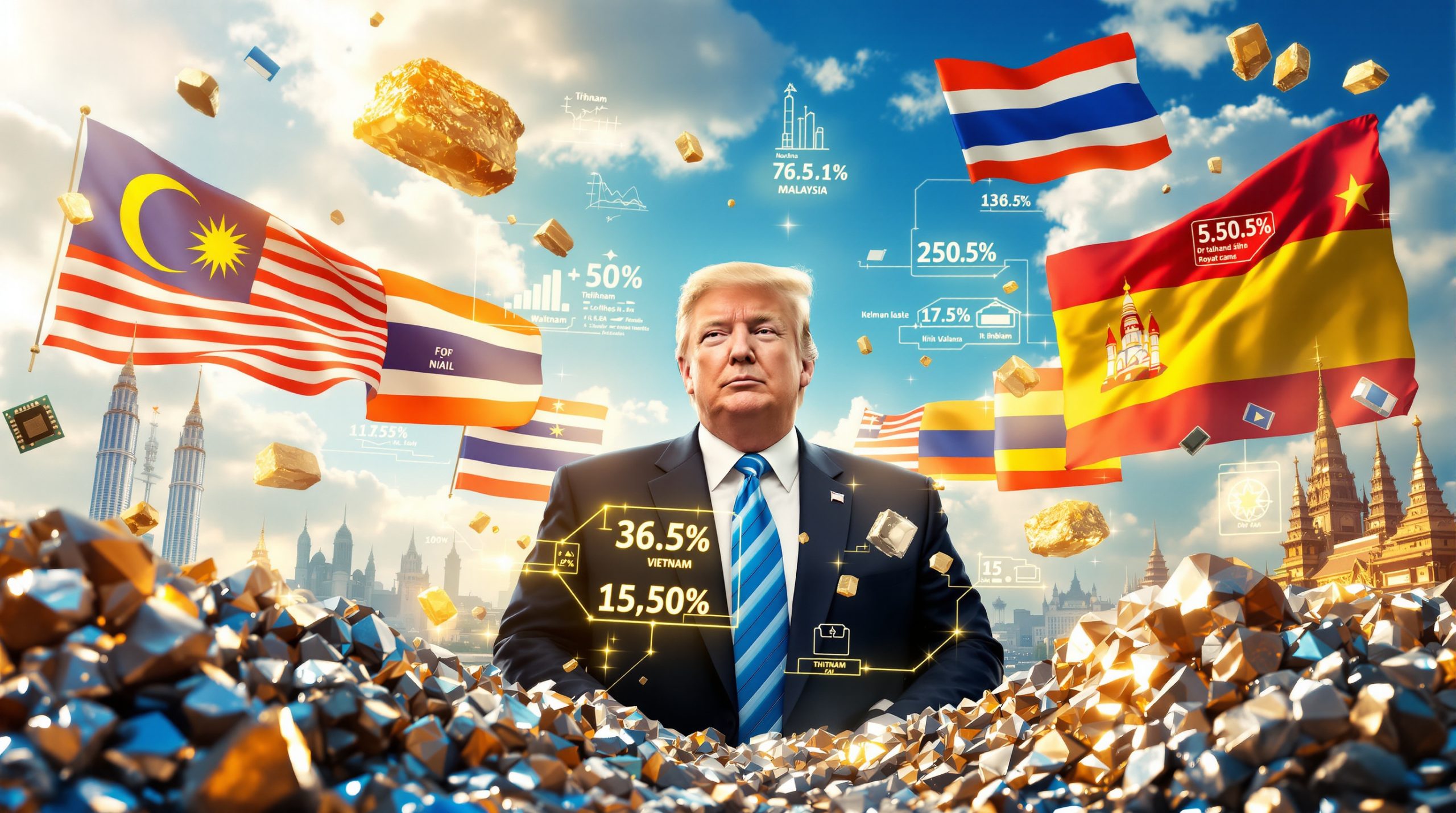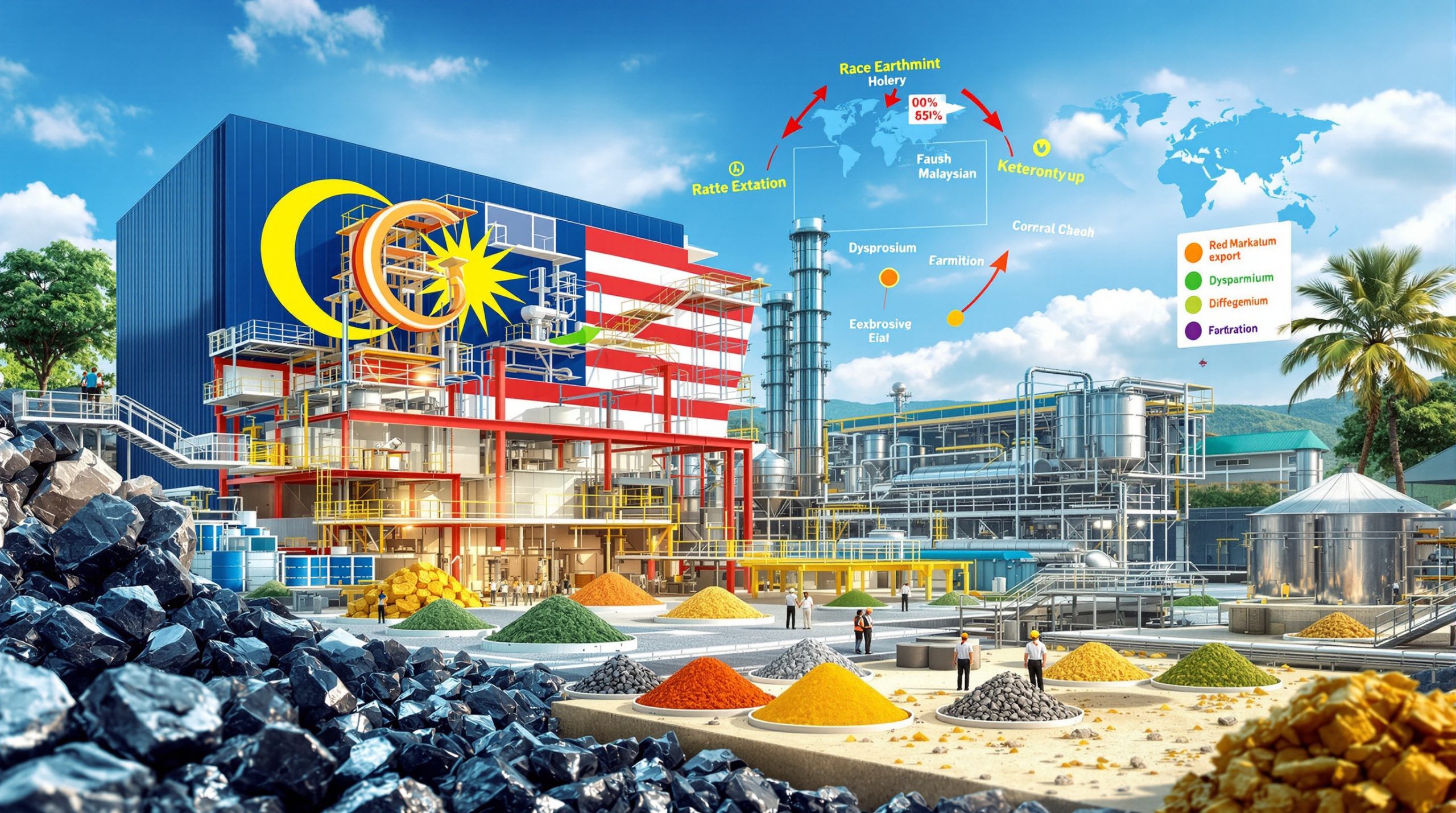Malaysia's strategic approach to rare earth exports represents a nuanced policy framework that distinguishes between raw material restrictions and processed product freedom. This dual-tier system reflects the country's commitment to value-added manufacturing while maintaining open global trade relationships, ensuring no lockdown on rare earths in Malaysia for processed products.
Understanding Malaysia's Strategic Export Framework
The Malaysian government has implemented a sophisticated export policy structure that carefully balances domestic economic development with international trade obligations. Unlike blanket export bans seen in other resource-rich nations, Malaysia's framework allows for strategic control over raw materials while ensuring no restrictions for processed products.
The policy architecture centers on encouraging domestic processing capabilities while preventing the export of unrefined rare earth concentrates. This approach emerged from extensive consultation with industry stakeholders and reflects Malaysia's long-term vision of becoming a regional hub for rare earth processing and manufacturing.
Key components of this framework include:
- Restrictions on raw rare earth ore exports to encourage domestic processing
- Open market access for refined rare earth elements and finished products
- Investment incentives for international companies establishing processing facilities
- Regulatory clarity for both domestic and foreign investors
Raw Materials vs. Processed Products: The Critical Difference
The distinction between raw materials and processed products forms the cornerstone of Malaysia's rare earth trade policy. Raw rare earth ores and concentrates face export restrictions designed to ensure adequate feedstock for domestic processing facilities. However, once these materials undergo separation and refinement processes, they can be freely exported without quotas or restrictions.
This value-chain positioning strategy reflects Malaysia's understanding of global supply chain dynamics. By processing rare earths domestically, the country captures significantly more value than would be possible through raw material exports alone. Furthermore, these mineral beneficiation insights demonstrate how developing nations can maximise economic returns from mineral resources.
The economic multiplier effect of downstream processing creates employment opportunities, attracts foreign investment, and develops technical expertise within the domestic workforce. The policy framework specifically encourages the production of separated rare earth oxides, rare earth metals and alloys, permanent magnets and magnetic assemblies, and specialised rare earth compounds for industrial applications.
How Malaysia's Trade Policy Differs from Resource Nationalism
Malaysia's approach stands in stark contrast to the resource nationalism strategies employed by several other critical mineral producers. While some countries have implemented comprehensive export bans or exclusive bilateral arrangements, Malaysia maintains a commitment to serving diverse international markets.
Open Market Approach vs. Export Restrictions
The Malaysian model prioritises market accessibility and supply chain reliability over protectionist policies. This approach recognises that long-term economic benefits derive from establishing the country as a dependable supplier to global markets rather than restricting trade relationships.
Malaysian Trade Minister Tengku Zafrul Aziz has emphasised that the country welcomes investment from all international partners, regardless of geographic origin or political alignment. This inclusive approach creates competitive dynamics that benefit Malaysian consumers and businesses while ensuring global customers have reliable access to processed rare earth products.
Consequently, the open market strategy offers several advantages including price competitiveness through multiple supplier relationships, technology transfer from diverse international partners, risk mitigation against single-country dependency, and innovation acceleration through competitive pressures.
Investment Climate for International Partners
Malaysia's regulatory environment actively encourages foreign investment in rare earth processing capabilities. The government has established clear guidelines for technology transfer requirements while maintaining flexibility in partnership structures. Companies from the United States, Europe, Japan, South Korea, and other regions have found Malaysia to be a welcoming destination for rare earth processing investments.
Investment incentives include tax holidays for qualifying projects, streamlined permitting processes for environmentally compliant operations, and infrastructure development support for major processing facilities. The regulatory framework ensures that foreign investors can repatriate profits while meeting domestic content and technology transfer objectives.
What Role Does Malaysia Play in Global Rare Earth Supply Diversification?
Malaysia's position in global rare earth supply chains extends far beyond its domestic production capabilities. The country serves as a critical processing hub for rare earth concentrates sourced from multiple international suppliers, creating a diversified supply base that reduces dependence on any single source country.
Strategic Positioning in Non-Chinese Supply Chains
Malaysia's rare earth processing industry has developed sophisticated separation and purification capabilities that rival those found in other major producing regions. The country's existing infrastructure includes advanced rare earth element separation facilities capable of producing high-purity oxides and metals for demanding applications.
Geographic advantages position Malaysia ideally for serving Asia-Pacific markets while maintaining efficient logistics connections to North American and European customers. In addition, the critical minerals energy transition requires reliable supply chains that Malaysia's strategic location can support effectively.
The country's established shipping infrastructure and free trade agreements facilitate cost-effective distribution of processed rare earth products globally. Malaysia's recent policy clarifications have provided additional certainty for international investors and trading partners.
Bilateral Trade Commitments and Market Access
Malaysia has established specific commitments with major consuming countries to ensure reliable supply chain access. The U.S.-Malaysia rare earth cooperation framework guarantees that American companies will have unrestricted access to Malaysian-processed rare earth products, including permanent magnets critical for defence and renewable energy applications.
These bilateral arrangements complement Malaysia's broader commitment to maintaining trading relationships with all international partners. The country has explicitly rejected exclusive supply agreements that would limit market access for other consuming nations, recognising that diversified customer bases provide greater economic stability.
How Does Malaysia's Policy Impact Global Rare Earth Markets?
The Malaysian approach to rare earth trade policy has significant implications for global supply chain resilience and market stability. By maintaining open export policies for processed products while restricting raw material exports, Malaysia contributes to supply diversification efforts while capturing greater domestic economic value.
Supply Chain Reliability and Diversification Benefits
Malaysia's commitment to unrestricted exports of processed rare earth products provides global manufacturers with an alternative supply source that reduces concentration risks. This diversification proves particularly valuable for industries requiring consistent access to high-quality rare earth materials, including electric vehicle manufacturing, renewable energy systems, and advanced electronics production.
The reliability of Malaysian supply chains stems from several factors including political stability and consistent policy implementation, infrastructure investment in processing and logistics capabilities, technical expertise developed through decades of rare earth processing experience, and environmental compliance meeting international sustainability standards.
Price stability implications of Malaysia's expanded processing capacity help moderate global rare earth markets. Furthermore, the European raw materials supply initiatives benefit significantly from Malaysia's open trade policies, which provide alternative sourcing options for European manufacturers.
Increased competition among processing facilities creates downward pressure on processing margins while ensuring adequate supply availability during periods of high demand.
Investment Opportunities in Malaysian Rare Earth Processing
The Malaysian rare earth sector presents diverse investment opportunities across the entire value chain. Foreign companies can participate through joint ventures with local partners, technology licensing arrangements, or direct investment in processing facilities.
Separation and Purification Facilities: Existing operations provide a foundation for expansion, with opportunities for advanced separation technologies that improve efficiency and reduce environmental impact. Investment requirements for major facility upgrades typically range from $50 million to $200 million depending on capacity and technology specifications.
Permanent Magnet Manufacturing: Limited domestic capacity in permanent magnet production represents a significant growth opportunity. Companies with expertise in magnet manufacturing can establish operations to serve both domestic and export markets, with particular demand from electric vehicle and renewable energy sectors.
Research and Development Centres: Malaysia encourages establishment of research facilities focused on rare earth applications and processing technologies. These investments qualify for enhanced tax incentives and government support for collaborative research programs with local universities and technical institutes.
Regional ASEAN Cooperation Framework
Malaysia participates in broader Southeast Asian initiatives to coordinate rare earth development across the region. ASEAN cooperation programs focus on sharing technical expertise, coordinating environmental standards, and developing integrated supply chain networks that span multiple member countries.
Regional collaboration initiatives include joint research programs, shared infrastructure development, and coordinated approaches to sustainable mining practices. These cooperative frameworks help smaller ASEAN members develop their rare earth potential while benefiting from Malaysia's established processing expertise.
What Are the Long-term Implications for Investors and Industry?
Malaysia's rare earth policy framework creates predictable conditions for long-term investment planning while maintaining flexibility to adapt to changing global market conditions. The government's commitment to open trade relationships provides confidence for international companies considering significant capital investments in processing infrastructure.
Market Access and Trading Flexibility
Guaranteed export pathways for processed materials eliminate concerns about sudden policy changes that could strand investments or limit market access. Malaysia's explicit rejection of export quotas or restrictions on finished rare earth products provides essential certainty for companies planning major capital expenditures.
Competitive pricing through efficient processing operations helps Malaysian companies compete effectively in global markets while generating sustainable returns for investors. Consequently, investors seeking to understand broader market dynamics can benefit from comprehensive investment strategies guide that outline optimal approaches for critical minerals investments.
The country's strategic location and established logistics networks provide cost advantages for serving major consuming regions. Investment protection mechanisms include bilateral investment treaties with major partner countries, dispute resolution procedures through international arbitration, regulatory stability commitments for qualified projects, and repatriation guarantees for foreign investment returns.
Technology Development and Innovation Opportunities
Malaysia actively promotes research collaboration programs with international institutions to advance rare earth processing technologies and develop new applications. Government support for innovation includes co-funding arrangements for qualifying research projects and tax incentives for companies establishing development centres.
Advanced processing technique development focuses on improving separation efficiency, reducing environmental impact, and developing specialised products for emerging applications. Companies investing in Malaysian research facilities gain access to local technical talent and government research grants.
Environmental sustainability improvements represent a priority area for technology development. Malaysia seeks partners with expertise in cleaner processing technologies, waste reduction systems, and closed-loop manufacturing processes that minimise environmental impact while improving economic efficiency.
How Does This Policy Address Global Supply Chain Concerns?
Malaysia's balanced approach to rare earth trade policy directly addresses key concerns about supply chain concentration and geopolitical risk in critical mineral markets. The country's commitment to serving diverse international customers while maintaining processing capabilities provides essential resilience for global supply networks.
Geopolitical Risk Mitigation
Reduced concentration risk in global rare earth processing emerges as a primary benefit of Malaysia's open trade policies. Companies previously dependent on single-source suppliers can diversify their procurement strategies by incorporating Malaysian processing capabilities into their supply chains.
Alternative supply routes prove particularly valuable for defence contractors and renewable energy manufacturers requiring reliable access to high-performance rare earth materials. For instance, the development of a strategic minerals reserve demonstrates how nations are building resilience against supply disruptions.
Strategic buffer capacity against potential trade disruptions provides additional security for global supply chains. Malaysia's processing facilities can absorb increased demand during supply interruptions from other sources, helping moderate price volatility and maintain production schedules for downstream manufacturers.
Environmental and Sustainability Considerations
Malaysia's rare earth industry operates under stringent environmental standards that meet or exceed international best practices. The government requires environmental impact assessments for all processing facilities and maintains ongoing monitoring programs to ensure compliance with air quality, water protection, and waste management standards.
Sustainable development goals alignment includes commitments to minimise the environmental footprint of rare earth processing while maximising economic benefits for local communities. Investment in cleaner processing technologies and waste reduction systems demonstrates Malaysia's commitment to responsible resource development.
Community impact mitigation strategies ensure that rare earth development benefits local populations through employment opportunities, infrastructure development, and social investment programs. Companies operating in Malaysia must demonstrate positive community engagement and contribute to local development initiatives.
What Should Investors Know About Malaysia's Rare Earth Future?
Malaysia's rare earth sector is positioned for significant expansion over the next decade, driven by growing global demand for clean energy technologies and electric vehicles. The government has outlined ambitious plans for increasing processing capacity while maintaining its commitment to open international trade relationships.
Production Capacity Expansion Plans
Projected processing facility developments through 2030 include substantial increases in separation capacity and the addition of downstream manufacturing capabilities. Government planning documents indicate target capacity increases of 200-300% for rare earth oxide production and the establishment of permanent magnet manufacturing facilities capable of serving regional demand.
Investment requirements for major infrastructure projects are estimated at $2-3 billion over the next five years, creating opportunities for both domestic and international investors. Government support programs provide co-financing for qualifying projects and streamlined permitting processes for environmentally compliant operations.
Expected timeline for increased global market share positions Malaysia to capture 15-20% of global rare earth processing capacity by 2030, compared to current levels of approximately 8-10%. This expansion depends on successful attraction of international investment and technology transfer partnerships.
Partnership Opportunities and Market Entry
Joint venture frameworks with Malaysian companies provide established pathways for international investors seeking market entry. Local partners bring regulatory expertise, established relationships, and knowledge of domestic business practices that facilitate successful project implementation.
Technology licensing and transfer arrangements offer alternatives to direct investment while ensuring access to Malaysian processing capabilities. Companies with proprietary separation or manufacturing technologies can establish licensing relationships that generate ongoing revenue streams while supporting Malaysian industrial development.
Export market development support programs help international investors identify and develop customer relationships for products manufactured in Malaysian facilities. Government trade promotion agencies provide market intelligence, facilitate customer introductions, and support participation in international trade shows and conferences.
However, the implementation of no lockdown on rare earths in Malaysia requires careful navigation of international relationships. Recent reports indicate Malaysia is actively seeking foreign partnerships to develop its rare earth sector while maintaining balanced trade relationships.
"Malaysia's 'no lockdown on rare earths' policy creates a unique opportunity for international investors to participate in a rapidly growing market while maintaining complete flexibility in customer relationships and export destinations. The combination of regulatory clarity, infrastructure support, and open trade policies positions Malaysia as an attractive destination for rare earth processing investments."
The Malaysian approach demonstrates that resource-rich countries can capture greater economic value from natural endowments while contributing to global supply chain resilience. This balanced strategy provides a model for other nations seeking to develop their critical mineral resources in ways that benefit both domestic economies and international customers.
Looking to Capitalise on the Growing Rare Earth Market?
Discovery Alert's proprietary Discovery IQ model delivers real-time alerts on significant ASX mineral discoveries, instantly empowering subscribers to identify actionable opportunities in critical minerals ahead of the broader market. Begin your 30-day free trial today and secure your market-leading advantage in the evolving rare earth and critical minerals sector.




